高中英语人教版必修一 Unit 4 Earthquakes单元要点复习课件(共35张PPT)
文档属性
| 名称 | 高中英语人教版必修一 Unit 4 Earthquakes单元要点复习课件(共35张PPT) |
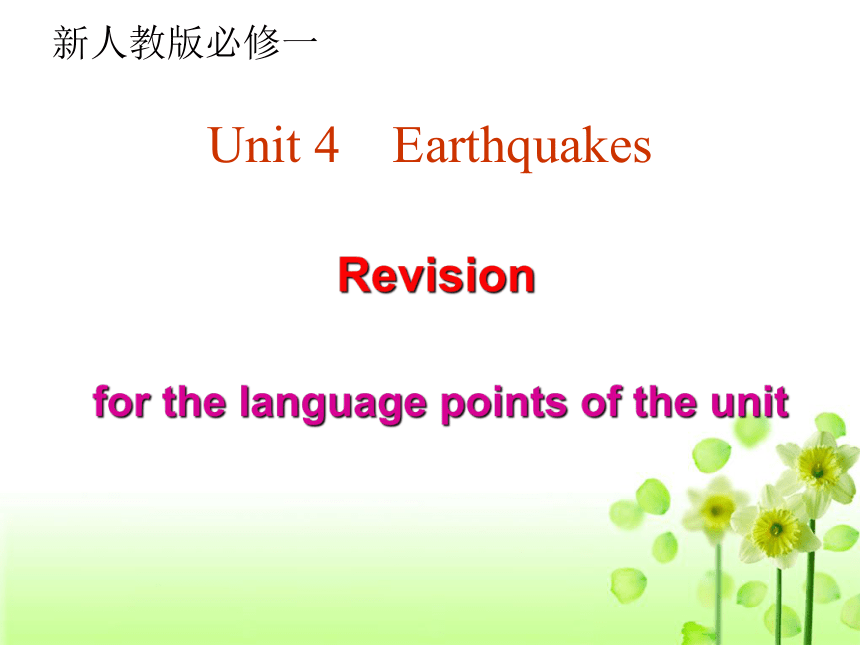
|
|
| 格式 | zip | ||
| 文件大小 | 300.5KB | ||
| 资源类型 | 教案 | ||
| 版本资源 | 人教版(新课程标准) | ||
| 科目 | 英语 | ||
| 更新时间 | 2019-12-13 22:12:47 | ||
图片预览

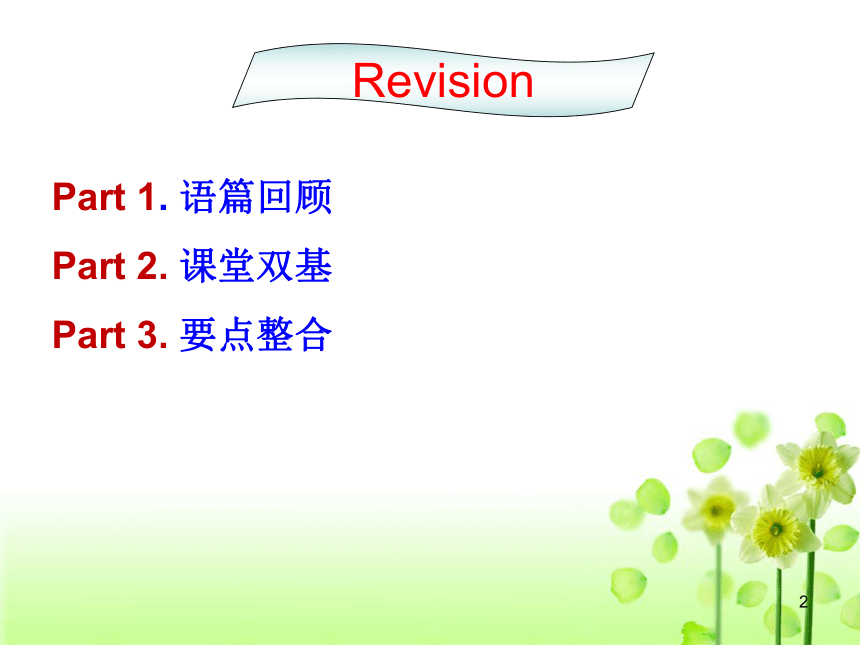
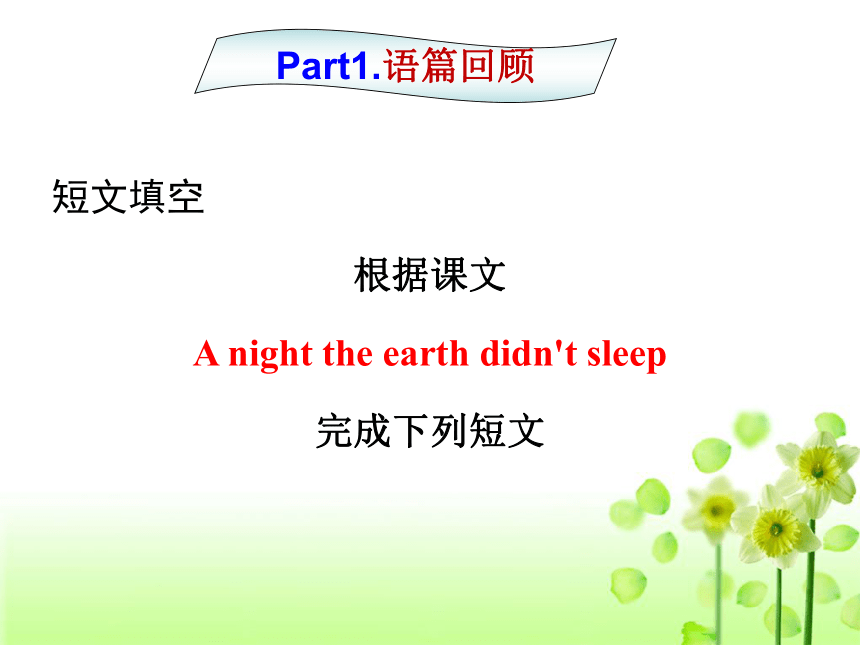
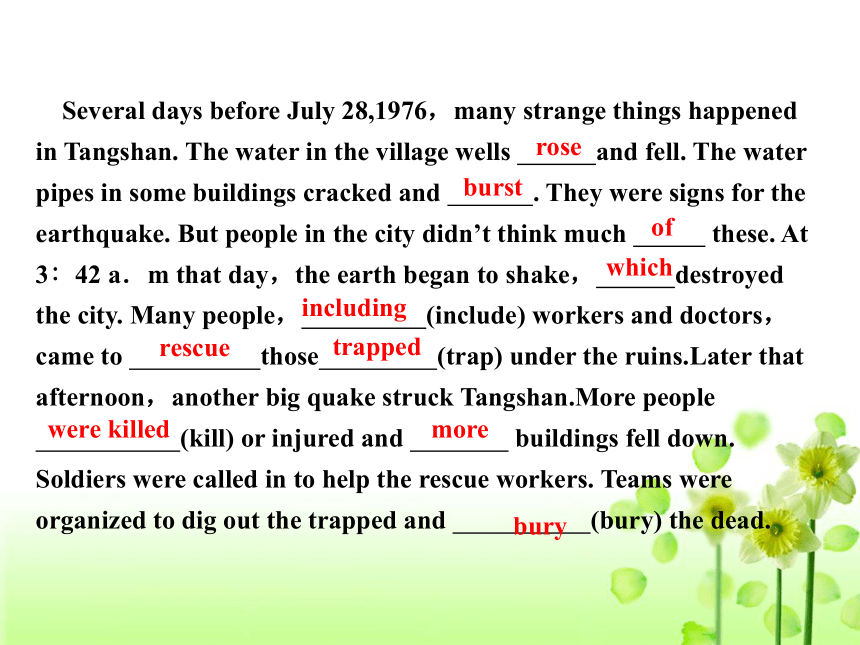
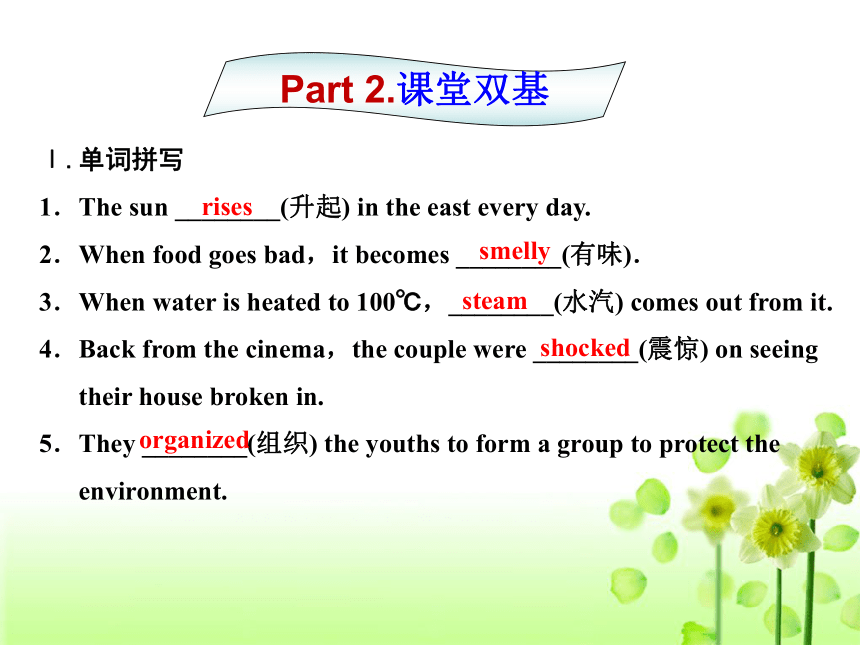
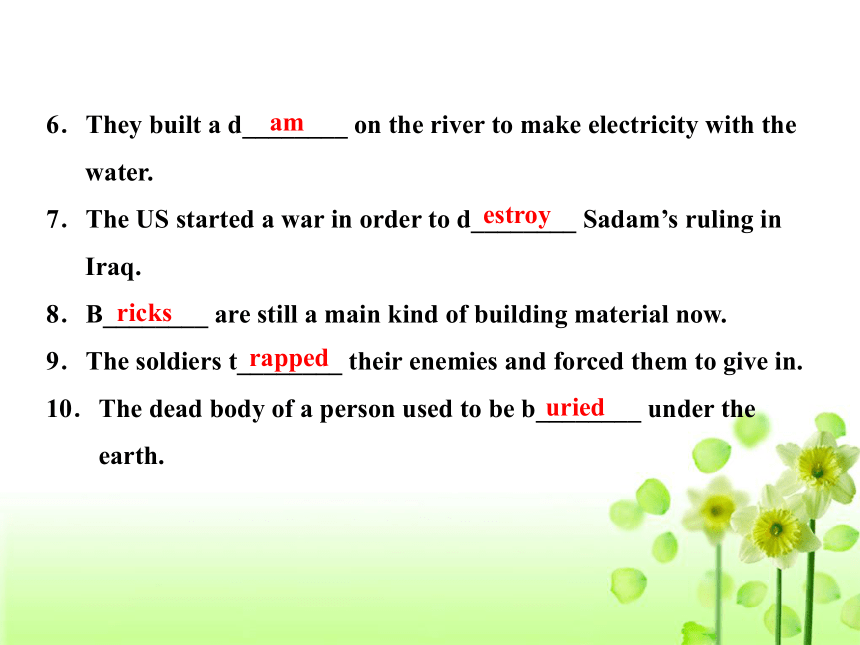
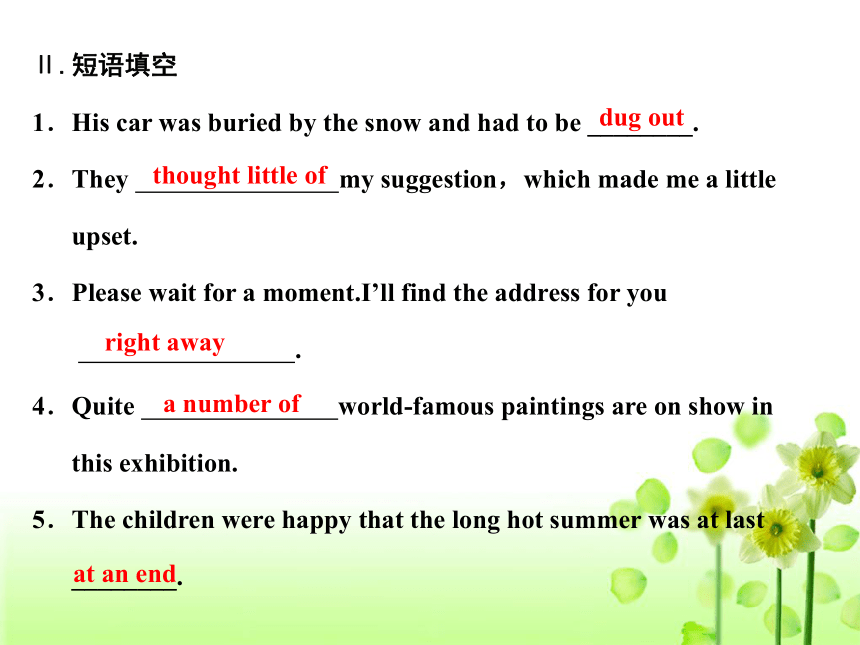
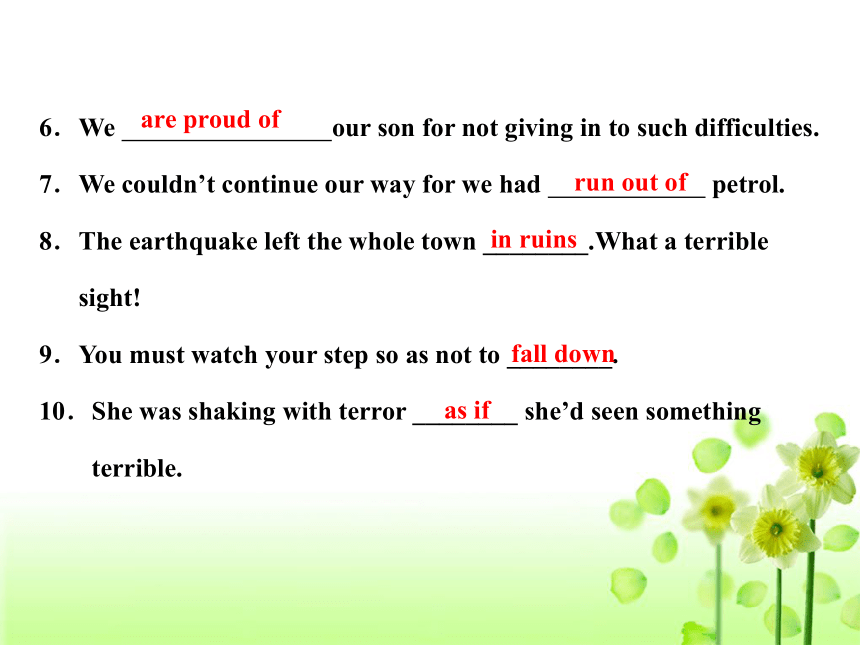
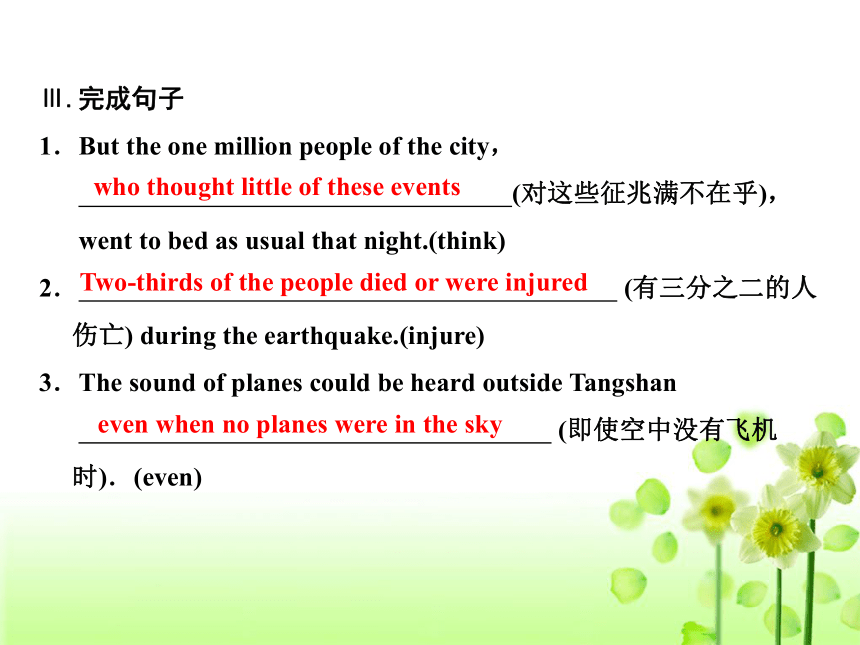
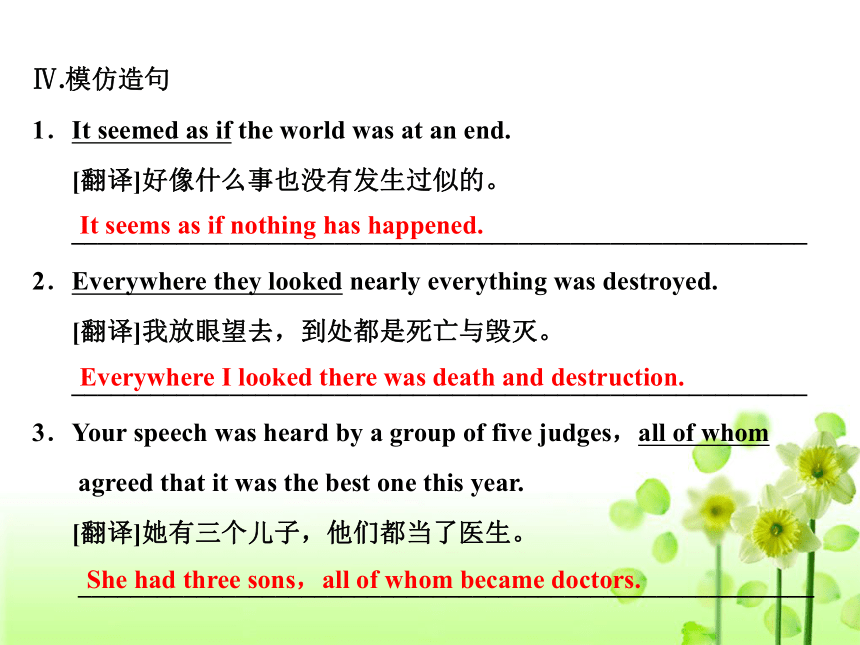
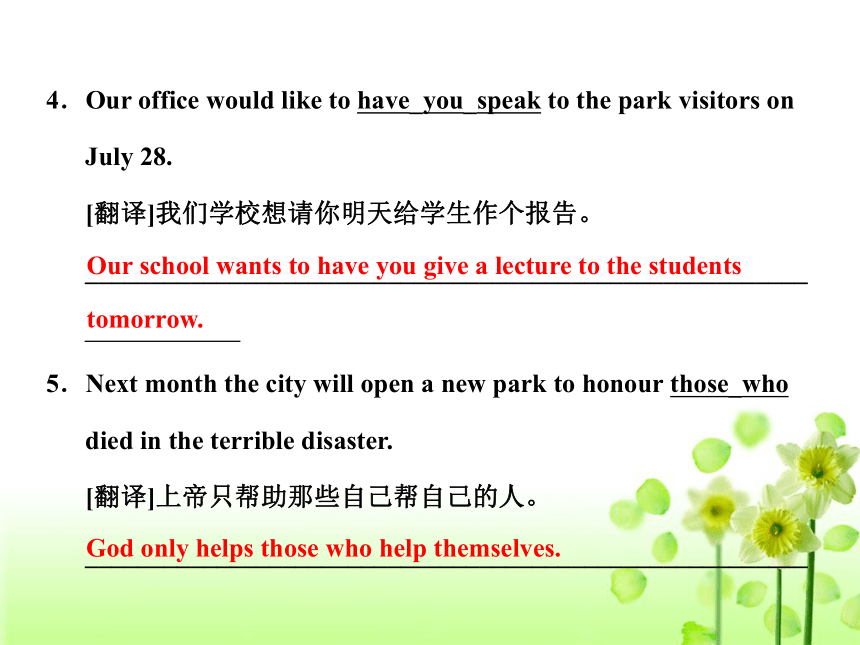
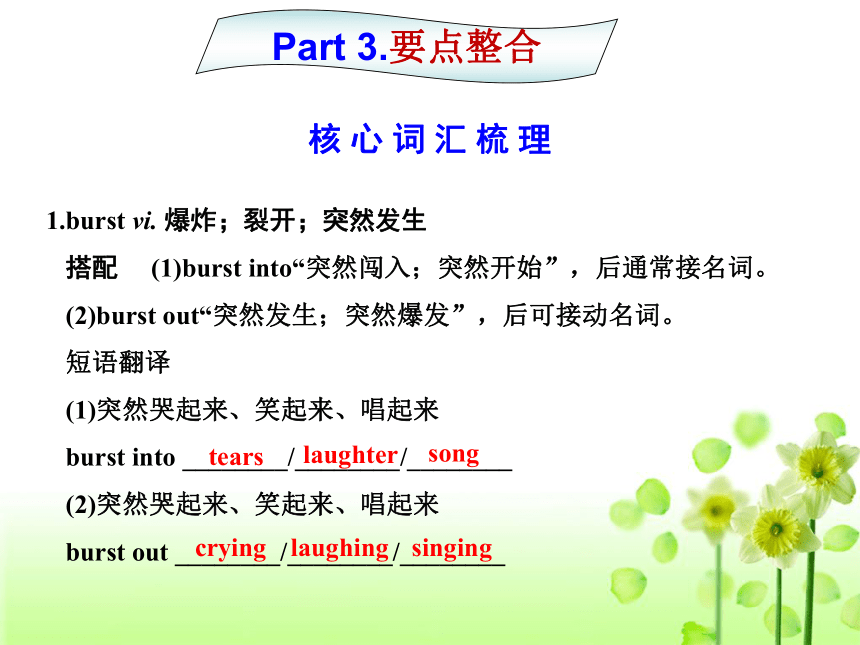
文档简介
(共35张PPT)
Revision
for the language points of the unit
新人教版必修一
Unit 4 Earthquakes
Part 1. 语篇回顾
Part 2. 课堂双基
Part 3. 要点整合
null
Revision
短文填空
根据课文
A night the earth didn't sleep
完成下列短文
Part1.语篇回顾
Several days before July 28,1976,many strange things happened in Tangshan. The water in the village wells and fell. The water pipes in some buildings cracked and . They were signs for the earthquake. But people in the city didn’t think much these. At 3∶42 a.m that day,the earth began to shake, destroyed the city. Many people, (include) workers and doctors,came to those (trap) under the ruins.Later that afternoon,another big quake struck Tangshan.More people
(kill) or injured and buildings fell down. Soldiers were called in to help the rescue workers. Teams were organized to dig out the trapped and (bury) the dead.
rose
burst
of
which
including
rescue
trapped
were killed
more
bury
Ⅰ.单词拼写
1.The sun ________(升起) in the east every day.
2.When food goes bad,it becomes ________(有味).
3.When water is heated to 100℃,________(水汽) comes out from it.
4.Back from the cinema,the couple were ________(震惊) on seeing
their house broken in.
5.They ________(组织) the youths to form a group to protect the
environment.
rises
smelly
steam
shocked
organized
Part 2.课堂双基
6.They built a d________ on the river to make electricity with the
water.
7.The US started a war in order to d________ Sadam’s ruling in
Iraq.
8.B________ are still a main kind of building material now.
9.The soldiers t________ their enemies and forced them to give in.
10.The dead body of a person used to be b________ under the
earth.
am
estroy
ricks
rapped
uried
Ⅱ.短语填空
1.His car was buried by the snow and had to be ________.
2.They my suggestion,which made me a little
upset.
3.Please wait for a moment.I’ll find the address for you
.
4.Quite world?famous paintings are on show in
this exhibition.
5.The children were happy that the long hot summer was at last
________.
dug out
thought little of
right away
a number of
at an end
6.We our son for not giving in to such difficulties.
7.We couldn’t continue our way for we had petrol.
8.The earthquake left the whole town ________.What a terrible
sight!
9.You must watch your step so as not to ________.
10.She was shaking with terror ________ she’d seen something
terrible.
are proud of
run out of
in ruins
fall down
as if
Ⅲ.完成句子
1.But the one million people of the city,
(对这些征兆满不在乎),
went to bed as usual that night.(think)
2. (有三分之二的人
伤亡) during the earthquake.(injure)
3.The sound of planes could be heard outside Tangshan
(即使空中没有飞机
时).(even)
who thought little of these events
Two?thirds of the people died or were injured
even when no planes were in the sky
Ⅳ.模仿造句
1.It seemed as if the world was at an end.
[翻译]好像什么事也没有发生过似的。
________________________________________________________
2.Everywhere they looked nearly everything was destroyed.
[翻译]我放眼望去,到处都是死亡与毁灭。
________________________________________________________
3.Your speech was heard by a group of five judges,all of whom
agreed that it was the best one this year.
[翻译]她有三个儿子,他们都当了医生。
________________________________________________________
It seems as if nothing has happened.
Everywhere I looked there was death and destruction.
She had three sons,all of whom became doctors.
4.Our office would like to have_you_speak to the park visitors on
July 28.
[翻译]我们学校想请你明天给学生作个报告。
_______________________________________________________
5.Next month the city will open a new park to honour those_who
died in the terrible disaster.
[翻译]上帝只帮助那些自己帮自己的人。
_______________________________________________________
Our school wants to have you give a lecture to the students tomorrow.
God only helps those who help themselves.
核 心 词 汇 梳 理
1.burst vi. 爆炸;裂开;突然发生
搭配 (1)burst into“突然闯入;突然开始”,后通常接名词。
(2)burst out“突然发生;突然爆发”,后可接动名词。
短语翻译
(1)突然哭起来、笑起来、唱起来
burst into ________/________/________
(2)突然哭起来、笑起来、唱起来
burst out ________/________/________
tears
laughter
song
crying
laughing
singing
Part 3.要点整合
完成句子
(3)飞机坠毁后猛烈燃烧起来。
The aircraft crashed and .
(4)看到她脸上的表情,他们都大笑起来。
They at the expression on her face.
联想 burst forth突然出现或发生
burst in突然插嘴;打断
break out突然发生,爆发
break into闯入;突然开始
burst into flames
burst out laughing
2.rise vi.&n. 上升,提高
His voice rose in excitement.他在兴奋中声音提高了。
搭配 (1)on the rise 在增长
(2)give rise to 引起
(3) rise to one’s feet 站起身
提示 rise也可用作可数名词,意为“上升,上涨;增长;升级(长
工资)”。如:Soon he got a rise.不久他加了工资。give sb. a rise给
某人加工资。
辨析 rise/raise/arise
rise不及物动词,作上升讲时指继续上升,常用于日、月、云、
雾、烟、水蒸汽、物价、温度、河水、潮水及人的职位等;
raise及物动词,举起,提出,饲养,种植,用作“举起”时,往往
有使物体达到应有的高度的含义,可用于具体或抽象的事物。
arise由……产生的;起床,起身,起立。
用rise和raise的正确形式填空
(1)The sun ________ in the east and sets in the west.
(2)He has formed the habit of ________ early in the morning.
(3)The price of tomatoes has been ________ recently.
(4)The price of tomatoes has ________ recently.
(5)He sat at the desk with his hand ________.
(6)When the needs ________,please let me know.
(7)He ________ when I entered.
rises
rising
raised
risen
raised
arise
arose
3.bury vt. 埋葬;掩藏
搭配 bury oneself in.../be buried in...埋头于;专心于
完成句子
(1)离婚后,她埋头于工作。
After the divorce,she .
(2)他专心学习。
He .
(3)你的信被压在一堆文件底下。
Your letter ____________________ under a pile of papers.
(4)他双手插在口袋里缓步而行。
He walked slowly,____________________ his pockets.
buried herself in her work
was buried in his studies
got buried
his hands buried in
4.ruin n. 废墟[复数];毁灭 vt.毁灭;使破产
搭配 be/lie in ruins严重受损,破败不堪
根据汉语意思,完成英文句子。
(1)我们参观了那个庙宇的遗迹。
We visited ________ of the temple.
(2)不要用粗糙的(harsh)肥皂洗脸。那会损坏你的皮肤。
Don’t use harsh soap to wash your face. It will .
(3)那城堡现在已成了一片废墟了。
The castle now .
the ruins
ruin your skin
lies in ruins
5.injure vt. 伤害,使受伤,损害
说出下列各句的大意。
(1)Three people were killed and five injured in the crash.
______________________________________________________
(2)He injured his knees yesterday.
_____________________________________________________
(3)I hope I didn’t injure her feelings.
______________________________________________________
(4)Dishonesty injures a business.
______________________________________________________
撞车事故中三人死亡,五人受伤。
他昨天伤了膝盖。
我希望我没有伤害她的感情。
欺骗有害生意。
派生 用injure的适当形式填空。
(5)________ adj.有害的(=harmful)
(6)________ n.伤害,损害
(7)He suffered serious ________ to the arms and legs.
(8)Smoking is ________ to health.
辨析 injure,hurt,wound
(1)injure常指在意外事故中受伤,可指身体上或精神上的伤害。
(2)hurt没有injure正式,可指身体上的疼痛或精神上的痛苦,也可指感情上的伤害。hurt的伤害可与injure同样严重,也可指较轻的疼痛。
(3)wound主要指用刀枪等武器打伤、切伤等,多指在战争中或战斗中受伤,有时也用于精神上的伤害,但远不及前两者常见。
injurious
injury
injuries
injurious
用injure,hurt或wound的适当形式填空。
(9)In that war he was seriously ________ by an enemy bullet.
(10)You’ll her feelings if you forget her birthday.
(11)No one was seriously in the traffic accident.
(12)The tight shoe ________ my foot.
(13)The (伤者) were rushed to hospital.
解析:(9)在战争中受伤通常用wound。
(10)在伤害情感或自尊,多用hurt或injure。
(11)指在事故中受伤,用injure或hurt都可以。
(12)指轻伤,表示使疼痛,一般只用hurt。
(13)表示“受伤的人”用the injured或the wounded。
wounded
injure/hurt
injured/hurt
hurt
injured/wounded
6.judge vt. 判断;判决;评价
As far as I can judge,all of them are to blame.依我看,他们都应承
担责任。
搭配 (1)judge sb./sth.(to be) ...认为某人(某事)是……
(2)judge...by/from...根据……判断……
完成句子
(1)这次巡回演出被认为是巨大的成功。
The tour was .
(2)在那种情况下,我们认为不去打扰他们是明智的。
At that point we ____________________ to leave them alone.
(3)你不能根据封面来判断一本书。
You can’t .
(4)人们常以学生的考试分数来评判教师的优劣。
Teachers tend to .
judged to have been a great success
judged it wise
judge a book by its cover
be judged by their students’ exam grades
7.shock v. (使)震惊;震动 n.休克;打击;震惊
派生 shocked(人)感到震惊的;shocking(事)令人震惊的
根据汉语意思,完成英文句子
(1)我听到这个消息十分震惊。(用多种表达法)
a.I to hear the news.
b.I the news.
c. me to hear the news.
d. The news a shock.
(2)听到这个令人震惊的消息,他感到震惊。
He was shocked .
was shocked
was shocked at
It shocked
gave me
to hear/at the shocking news
8.rescue n.&vt. 援救;营救
搭配 (1)rescue sb./sth. from...抢救,营救,援救
(2)go/come to one’s rescue进行援救;营救某人
辨析 (1)rescue多指在直接的危险或祸患中给予迅速和有效的
救援,较save更能表达拯救的紧迫性,一般指救人;它还有从
监禁中救出的意思。
(2)save指通过救援不但使受害者(人或物)能脱离危险或祸患,
而且使其能保存下来,有时可与rescue通用。从某种状态中把
某人拯救出来多 用save。
用rescue或save填空,并说明理由。
(1)只有社会主义才能救中国。
Only socialism can ________ China.
(2)救生艇被派出去救沉船的水手。
The life boat was sent out to ________ the sailors from the sinking ship.
(3)消防队员行动及时,该建筑物方免遭焚毁。
The quick action of the firemen ________ the building from being burned down.
save
rescue
saved
重 点 短 语 例 释
1.think little of 对……评价不高
有些人对电视上选超级女生评价不高。
Some people selecting super girls on TV.
联想 think highly/well/a lot/much of 对……有好评
think poorly/badly/of 对……评价不好
think nothing/little of sth. 视为平常;不当一回事
think nothing of it 不用谢,不要介意
speak well/ill of 说……的好/坏话
think little of
2.give out 分发;发出(气味、热等);发表;用尽
My legs gave out and I couldn’t walk any farther.
我腿撑不住了,不能再往前走了。
The results of the examination won’t be given out.
考试结果不会公布。
联想 give up 放弃 give in 屈服,让步
give off 发出 give away 赠送
give out用完;艳尽;停止运行
用give的相关短语填空
(1)It was the mayor who ________ the prizes to the winners.
(2)Finally he ________ to my views.
(3)Never ________ the study of English.
(4)Our food will ________.
gave away
gave in
give up
give out
3.at an end 结束,终结(=finished);在末尾
联想 at the end of 在……的尽头/末端(指时间、地点等)
by the end of 在之前(常与完成时连用)(指时间)
in the end 最后,终于(=finally)
put an end to... 结束……(vt.)
come to an end ……结束(vi.)
用适当的介词填空
(1)________ the end of last month we went to Shanghai to have a
competition.
(2)________ the end of last week we had learned six units.
(3)________ the end we finished the work ahead of time with their
help.
(4)Our hard time was ________ an end.
At
By
In
at
4.a number of 若干;许多,大量的
A number of questions have been solved.一些问题已经解决了。
提示 a number of后接可数名词复数,作主语时谓语动词用复
数形式,其中number前可用large,great,small,good等修饰。
归纳 a large number of许多,大量的
a small number of少量的
many a后接可数名词单数
a lot of/plenty of后接可数名词复数或不可数名词
辨析 a number of/the number of
a number of(大量的)+可数名词复数,中心词是复数可数名词,
所以其后的谓语动词要用复数形式;the number of(……的数量)
+可数名词复数,中心词是number,所以其后的谓语动词要用
单数。
改错
(1)A number of private colleges has increased. ________
(2)A great many of books are very interesting. ________
A→The
of去掉
疑 难 语 句 细 解
1.It seemed as if the world was at an end!仿佛到了世界末日!
句型 It seemed as if/that...似乎;好像
提醒 根据从句所说情况是可能的还是假设,而采用陈述或虚拟
语气。
根据汉语意思填空
(1)他们似乎正在为出租车费而争执。
It seem that ____________________ about the taxi fare.
(=They seem to be arguing about the taxi fare.)
(2)好像什么事也没有发生过似的。
It seemed as if nothing ____________________.
(3)现在仿佛已经是春天了。
It seems as if ____________________ already.
they are arguing
had happened
it was spring
2.Everywhere they looked nearly everything was destroyed.
人们无论朝哪里看,哪里的一切都几乎被毁了。
句型 Everywhere...无论哪里……,都……。
说明 everywhere意为“无论哪儿”,在句中引导一个状语从句,
相当于wherever。
根据汉语意思,完成英语句子。
(1)无论他走到哪儿,他的狗就跟到哪儿。
Everywhere he goes,____________________.
(2)他们不论出现在哪儿,都会遇到强烈的抗议。
,they would meet with strong
protests.
(3)持有专用火车票,就可以到欧洲你喜欢的任何地方去旅游。
With a special train ticket you can travel ____________________.
his dog will follow him
Everywhere they appeared
everywhere you like
3.there be 句型
There being a bus stop so near the house is a great advantage.(主语)
停车点离家近,真是方便极了。
It’s impossible for there to be any more.不可能再有了。
表示“某个事物”在“什么地方”,其结构为“there be+主语+其他
成分”。there为引导词,本身无意义,谓语动词按照就近一致原
则。
归纳 There happen to be 碰巧……
There seem to be 似乎(有)……
There is likely to be 可能……
There may/might be 可能(会)……
There must be 一定……
There can’t be 不可能……
There is said to be 据说(有)……
There’s reported to be 据报道(有)
There used to be 过去常常
There’s sure/certain to be 一定会……
(1)There ________(be) a desk and three chairs in the room.
(2)There ________(be) three chairs and a desk in the room.
(3)There ________(存在) no life on the moon.
(4)There ________(仍有) some problems to be solved.
(5)There ________(升起) a heavy smoke on the roof.
(6)There ________(似乎) to be something wrong.
(7)There ________(碰巧) to be a tree on the top.
(8)There ________(据说) to be troops on the frontier.
is
are
exists
remain
rose
appears
happens
was said
(9)There (希望) to be more discussion.
(10)We expect there ____________________(不再有争辩).
(11)He was disappointed at there ____________________(能做的事太少).
(12)There (房间里没有人),he didn’t go in.
(13)It was too late for there ____________________(没有公共汽车了).
is expected
to be no arguments
being so little to do
being nobody in the room
to be any buses
Revise the whole unit and finish off the additional exercises.
Homework
null
Revision
for the language points of the unit
新人教版必修一
Unit 4 Earthquakes
Part 1. 语篇回顾
Part 2. 课堂双基
Part 3. 要点整合
null
Revision
短文填空
根据课文
A night the earth didn't sleep
完成下列短文
Part1.语篇回顾
Several days before July 28,1976,many strange things happened in Tangshan. The water in the village wells and fell. The water pipes in some buildings cracked and . They were signs for the earthquake. But people in the city didn’t think much these. At 3∶42 a.m that day,the earth began to shake, destroyed the city. Many people, (include) workers and doctors,came to those (trap) under the ruins.Later that afternoon,another big quake struck Tangshan.More people
(kill) or injured and buildings fell down. Soldiers were called in to help the rescue workers. Teams were organized to dig out the trapped and (bury) the dead.
rose
burst
of
which
including
rescue
trapped
were killed
more
bury
Ⅰ.单词拼写
1.The sun ________(升起) in the east every day.
2.When food goes bad,it becomes ________(有味).
3.When water is heated to 100℃,________(水汽) comes out from it.
4.Back from the cinema,the couple were ________(震惊) on seeing
their house broken in.
5.They ________(组织) the youths to form a group to protect the
environment.
rises
smelly
steam
shocked
organized
Part 2.课堂双基
6.They built a d________ on the river to make electricity with the
water.
7.The US started a war in order to d________ Sadam’s ruling in
Iraq.
8.B________ are still a main kind of building material now.
9.The soldiers t________ their enemies and forced them to give in.
10.The dead body of a person used to be b________ under the
earth.
am
estroy
ricks
rapped
uried
Ⅱ.短语填空
1.His car was buried by the snow and had to be ________.
2.They my suggestion,which made me a little
upset.
3.Please wait for a moment.I’ll find the address for you
.
4.Quite world?famous paintings are on show in
this exhibition.
5.The children were happy that the long hot summer was at last
________.
dug out
thought little of
right away
a number of
at an end
6.We our son for not giving in to such difficulties.
7.We couldn’t continue our way for we had petrol.
8.The earthquake left the whole town ________.What a terrible
sight!
9.You must watch your step so as not to ________.
10.She was shaking with terror ________ she’d seen something
terrible.
are proud of
run out of
in ruins
fall down
as if
Ⅲ.完成句子
1.But the one million people of the city,
(对这些征兆满不在乎),
went to bed as usual that night.(think)
2. (有三分之二的人
伤亡) during the earthquake.(injure)
3.The sound of planes could be heard outside Tangshan
(即使空中没有飞机
时).(even)
who thought little of these events
Two?thirds of the people died or were injured
even when no planes were in the sky
Ⅳ.模仿造句
1.It seemed as if the world was at an end.
[翻译]好像什么事也没有发生过似的。
________________________________________________________
2.Everywhere they looked nearly everything was destroyed.
[翻译]我放眼望去,到处都是死亡与毁灭。
________________________________________________________
3.Your speech was heard by a group of five judges,all of whom
agreed that it was the best one this year.
[翻译]她有三个儿子,他们都当了医生。
________________________________________________________
It seems as if nothing has happened.
Everywhere I looked there was death and destruction.
She had three sons,all of whom became doctors.
4.Our office would like to have_you_speak to the park visitors on
July 28.
[翻译]我们学校想请你明天给学生作个报告。
_______________________________________________________
5.Next month the city will open a new park to honour those_who
died in the terrible disaster.
[翻译]上帝只帮助那些自己帮自己的人。
_______________________________________________________
Our school wants to have you give a lecture to the students tomorrow.
God only helps those who help themselves.
核 心 词 汇 梳 理
1.burst vi. 爆炸;裂开;突然发生
搭配 (1)burst into“突然闯入;突然开始”,后通常接名词。
(2)burst out“突然发生;突然爆发”,后可接动名词。
短语翻译
(1)突然哭起来、笑起来、唱起来
burst into ________/________/________
(2)突然哭起来、笑起来、唱起来
burst out ________/________/________
tears
laughter
song
crying
laughing
singing
Part 3.要点整合
完成句子
(3)飞机坠毁后猛烈燃烧起来。
The aircraft crashed and .
(4)看到她脸上的表情,他们都大笑起来。
They at the expression on her face.
联想 burst forth突然出现或发生
burst in突然插嘴;打断
break out突然发生,爆发
break into闯入;突然开始
burst into flames
burst out laughing
2.rise vi.&n. 上升,提高
His voice rose in excitement.他在兴奋中声音提高了。
搭配 (1)on the rise 在增长
(2)give rise to 引起
(3) rise to one’s feet 站起身
提示 rise也可用作可数名词,意为“上升,上涨;增长;升级(长
工资)”。如:Soon he got a rise.不久他加了工资。give sb. a rise给
某人加工资。
辨析 rise/raise/arise
rise不及物动词,作上升讲时指继续上升,常用于日、月、云、
雾、烟、水蒸汽、物价、温度、河水、潮水及人的职位等;
raise及物动词,举起,提出,饲养,种植,用作“举起”时,往往
有使物体达到应有的高度的含义,可用于具体或抽象的事物。
arise由……产生的;起床,起身,起立。
用rise和raise的正确形式填空
(1)The sun ________ in the east and sets in the west.
(2)He has formed the habit of ________ early in the morning.
(3)The price of tomatoes has been ________ recently.
(4)The price of tomatoes has ________ recently.
(5)He sat at the desk with his hand ________.
(6)When the needs ________,please let me know.
(7)He ________ when I entered.
rises
rising
raised
risen
raised
arise
arose
3.bury vt. 埋葬;掩藏
搭配 bury oneself in.../be buried in...埋头于;专心于
完成句子
(1)离婚后,她埋头于工作。
After the divorce,she .
(2)他专心学习。
He .
(3)你的信被压在一堆文件底下。
Your letter ____________________ under a pile of papers.
(4)他双手插在口袋里缓步而行。
He walked slowly,____________________ his pockets.
buried herself in her work
was buried in his studies
got buried
his hands buried in
4.ruin n. 废墟[复数];毁灭 vt.毁灭;使破产
搭配 be/lie in ruins严重受损,破败不堪
根据汉语意思,完成英文句子。
(1)我们参观了那个庙宇的遗迹。
We visited ________ of the temple.
(2)不要用粗糙的(harsh)肥皂洗脸。那会损坏你的皮肤。
Don’t use harsh soap to wash your face. It will .
(3)那城堡现在已成了一片废墟了。
The castle now .
the ruins
ruin your skin
lies in ruins
5.injure vt. 伤害,使受伤,损害
说出下列各句的大意。
(1)Three people were killed and five injured in the crash.
______________________________________________________
(2)He injured his knees yesterday.
_____________________________________________________
(3)I hope I didn’t injure her feelings.
______________________________________________________
(4)Dishonesty injures a business.
______________________________________________________
撞车事故中三人死亡,五人受伤。
他昨天伤了膝盖。
我希望我没有伤害她的感情。
欺骗有害生意。
派生 用injure的适当形式填空。
(5)________ adj.有害的(=harmful)
(6)________ n.伤害,损害
(7)He suffered serious ________ to the arms and legs.
(8)Smoking is ________ to health.
辨析 injure,hurt,wound
(1)injure常指在意外事故中受伤,可指身体上或精神上的伤害。
(2)hurt没有injure正式,可指身体上的疼痛或精神上的痛苦,也可指感情上的伤害。hurt的伤害可与injure同样严重,也可指较轻的疼痛。
(3)wound主要指用刀枪等武器打伤、切伤等,多指在战争中或战斗中受伤,有时也用于精神上的伤害,但远不及前两者常见。
injurious
injury
injuries
injurious
用injure,hurt或wound的适当形式填空。
(9)In that war he was seriously ________ by an enemy bullet.
(10)You’ll her feelings if you forget her birthday.
(11)No one was seriously in the traffic accident.
(12)The tight shoe ________ my foot.
(13)The (伤者) were rushed to hospital.
解析:(9)在战争中受伤通常用wound。
(10)在伤害情感或自尊,多用hurt或injure。
(11)指在事故中受伤,用injure或hurt都可以。
(12)指轻伤,表示使疼痛,一般只用hurt。
(13)表示“受伤的人”用the injured或the wounded。
wounded
injure/hurt
injured/hurt
hurt
injured/wounded
6.judge vt. 判断;判决;评价
As far as I can judge,all of them are to blame.依我看,他们都应承
担责任。
搭配 (1)judge sb./sth.(to be) ...认为某人(某事)是……
(2)judge...by/from...根据……判断……
完成句子
(1)这次巡回演出被认为是巨大的成功。
The tour was .
(2)在那种情况下,我们认为不去打扰他们是明智的。
At that point we ____________________ to leave them alone.
(3)你不能根据封面来判断一本书。
You can’t .
(4)人们常以学生的考试分数来评判教师的优劣。
Teachers tend to .
judged to have been a great success
judged it wise
judge a book by its cover
be judged by their students’ exam grades
7.shock v. (使)震惊;震动 n.休克;打击;震惊
派生 shocked(人)感到震惊的;shocking(事)令人震惊的
根据汉语意思,完成英文句子
(1)我听到这个消息十分震惊。(用多种表达法)
a.I to hear the news.
b.I the news.
c. me to hear the news.
d. The news a shock.
(2)听到这个令人震惊的消息,他感到震惊。
He was shocked .
was shocked
was shocked at
It shocked
gave me
to hear/at the shocking news
8.rescue n.&vt. 援救;营救
搭配 (1)rescue sb./sth. from...抢救,营救,援救
(2)go/come to one’s rescue进行援救;营救某人
辨析 (1)rescue多指在直接的危险或祸患中给予迅速和有效的
救援,较save更能表达拯救的紧迫性,一般指救人;它还有从
监禁中救出的意思。
(2)save指通过救援不但使受害者(人或物)能脱离危险或祸患,
而且使其能保存下来,有时可与rescue通用。从某种状态中把
某人拯救出来多 用save。
用rescue或save填空,并说明理由。
(1)只有社会主义才能救中国。
Only socialism can ________ China.
(2)救生艇被派出去救沉船的水手。
The life boat was sent out to ________ the sailors from the sinking ship.
(3)消防队员行动及时,该建筑物方免遭焚毁。
The quick action of the firemen ________ the building from being burned down.
save
rescue
saved
重 点 短 语 例 释
1.think little of 对……评价不高
有些人对电视上选超级女生评价不高。
Some people selecting super girls on TV.
联想 think highly/well/a lot/much of 对……有好评
think poorly/badly/of 对……评价不好
think nothing/little of sth. 视为平常;不当一回事
think nothing of it 不用谢,不要介意
speak well/ill of 说……的好/坏话
think little of
2.give out 分发;发出(气味、热等);发表;用尽
My legs gave out and I couldn’t walk any farther.
我腿撑不住了,不能再往前走了。
The results of the examination won’t be given out.
考试结果不会公布。
联想 give up 放弃 give in 屈服,让步
give off 发出 give away 赠送
give out用完;艳尽;停止运行
用give的相关短语填空
(1)It was the mayor who ________ the prizes to the winners.
(2)Finally he ________ to my views.
(3)Never ________ the study of English.
(4)Our food will ________.
gave away
gave in
give up
give out
3.at an end 结束,终结(=finished);在末尾
联想 at the end of 在……的尽头/末端(指时间、地点等)
by the end of 在之前(常与完成时连用)(指时间)
in the end 最后,终于(=finally)
put an end to... 结束……(vt.)
come to an end ……结束(vi.)
用适当的介词填空
(1)________ the end of last month we went to Shanghai to have a
competition.
(2)________ the end of last week we had learned six units.
(3)________ the end we finished the work ahead of time with their
help.
(4)Our hard time was ________ an end.
At
By
In
at
4.a number of 若干;许多,大量的
A number of questions have been solved.一些问题已经解决了。
提示 a number of后接可数名词复数,作主语时谓语动词用复
数形式,其中number前可用large,great,small,good等修饰。
归纳 a large number of许多,大量的
a small number of少量的
many a后接可数名词单数
a lot of/plenty of后接可数名词复数或不可数名词
辨析 a number of/the number of
a number of(大量的)+可数名词复数,中心词是复数可数名词,
所以其后的谓语动词要用复数形式;the number of(……的数量)
+可数名词复数,中心词是number,所以其后的谓语动词要用
单数。
改错
(1)A number of private colleges has increased. ________
(2)A great many of books are very interesting. ________
A→The
of去掉
疑 难 语 句 细 解
1.It seemed as if the world was at an end!仿佛到了世界末日!
句型 It seemed as if/that...似乎;好像
提醒 根据从句所说情况是可能的还是假设,而采用陈述或虚拟
语气。
根据汉语意思填空
(1)他们似乎正在为出租车费而争执。
It seem that ____________________ about the taxi fare.
(=They seem to be arguing about the taxi fare.)
(2)好像什么事也没有发生过似的。
It seemed as if nothing ____________________.
(3)现在仿佛已经是春天了。
It seems as if ____________________ already.
they are arguing
had happened
it was spring
2.Everywhere they looked nearly everything was destroyed.
人们无论朝哪里看,哪里的一切都几乎被毁了。
句型 Everywhere...无论哪里……,都……。
说明 everywhere意为“无论哪儿”,在句中引导一个状语从句,
相当于wherever。
根据汉语意思,完成英语句子。
(1)无论他走到哪儿,他的狗就跟到哪儿。
Everywhere he goes,____________________.
(2)他们不论出现在哪儿,都会遇到强烈的抗议。
,they would meet with strong
protests.
(3)持有专用火车票,就可以到欧洲你喜欢的任何地方去旅游。
With a special train ticket you can travel ____________________.
his dog will follow him
Everywhere they appeared
everywhere you like
3.there be 句型
There being a bus stop so near the house is a great advantage.(主语)
停车点离家近,真是方便极了。
It’s impossible for there to be any more.不可能再有了。
表示“某个事物”在“什么地方”,其结构为“there be+主语+其他
成分”。there为引导词,本身无意义,谓语动词按照就近一致原
则。
归纳 There happen to be 碰巧……
There seem to be 似乎(有)……
There is likely to be 可能……
There may/might be 可能(会)……
There must be 一定……
There can’t be 不可能……
There is said to be 据说(有)……
There’s reported to be 据报道(有)
There used to be 过去常常
There’s sure/certain to be 一定会……
(1)There ________(be) a desk and three chairs in the room.
(2)There ________(be) three chairs and a desk in the room.
(3)There ________(存在) no life on the moon.
(4)There ________(仍有) some problems to be solved.
(5)There ________(升起) a heavy smoke on the roof.
(6)There ________(似乎) to be something wrong.
(7)There ________(碰巧) to be a tree on the top.
(8)There ________(据说) to be troops on the frontier.
is
are
exists
remain
rose
appears
happens
was said
(9)There (希望) to be more discussion.
(10)We expect there ____________________(不再有争辩).
(11)He was disappointed at there ____________________(能做的事太少).
(12)There (房间里没有人),he didn’t go in.
(13)It was too late for there ____________________(没有公共汽车了).
is expected
to be no arguments
being so little to do
being nobody in the room
to be any buses
Revise the whole unit and finish off the additional exercises.
Homework
null
